Bakman Technologies Inc. has been awarded a National Science Foundation (NSF) Small Business Innovation Research (SBIR) grant to develop a low-cost, high-performance, UAV mounted Terahertz (THz) spectrometer. These ‘THz Drones’ will be employed to perform spot measurements of the concentrations of a broad range of gases that contribute to pollution and global warming. They can make measurements right at the point of emission allowing location-specific, real-time, detection.
“We are extremely grateful to the NSF for recognizing the importance and potential our Terahertz technology has for combating the global problem of air pollution,” states Dr. Joseph R. Demers, the CEO of Bakman Technologies. “Because of the atmospheric science that has already occurred, our ‘THz Drones’ will be able to make an impact in a very short amount of time.”
“The National Science Foundation supports small businesses with the most innovative, cutting- edge ideas that have the potential to become great commercial successes and make huge societal impacts,” said Barry Johnson, Director of the NSF’s Division of Industrial Innovation and Partnerships. “We hope that this seed funding will spark solutions to some of the most important challenges of our time across all areas of science and technology.”
once a small business is awarded a Phase I SBIR/STTR grant (up to $225,000), it becomes eligible to apply for a Phase II grant (up to $750,000). Small businesses with Phase II grants are eligible to receive up to $500,000 in additional matching funds with qualifying third-party investment or sales.





